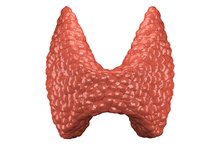What Are the Benefits of a Slow Metabolism?
While a lightning-fast metabolism can make it easier to lose weight, it won't necessarily make you healthier. The advantage of burning a lot of energy and easy weight control may have a trade-off in terms of life expectancy. Research suggests that a slow metabolism may help extend your lifespan while a fast metabolism may cause you to age more quickly. (ref1)
A Slow Metabolism May Delay Aging
A slow metabolism could be beneficial to longevity because it prevents you from wearing out too quickly. The theory says that if your body works too hard and too fast, it may deteriorate prematurely -- just like a machine. (ref1, ref5) A review in the Journal of Nutrition published in 2002 reflected that many small animals with a high daily energy expenditure also have a short lifespan. (ref 5)
A higher daily calorie burn also correlates with a shorter lifespan in humans, as shown by a 2011 study of 652 people published in the Journal of Clinical Endocrinology and Metabolism. Over the study period of 15 years, people who had a higher resting metabolic rate were more likely to die early of natural causes. (Ref6)
Limiting your calorie intake slows your metabolism, and might extend lifespan because it reduces exposure to cell-damaging free radicals. Every time you digest food, these free radicals are formed – so it makes sense that eating less foods will lessen your exposure to these compounds.
People who restrict calorie intake, without deprivation of nutrients, experience some of the same metabolic and hormonal adaptations that favor longevity. Research is inconclusive as to whether this strategy actually increases your lifespan, though, reports a review in a 2009 issue of the Current Opinion in Gastroenterology. (ref7)
Sluggish Thyroid and Metabolism May Lengthen Your Life
Soy and Hormonal Imbalance
Learn More
Your resting metabolic rate consists of all the energy your body uses to fuel basic function. This is the part of your metabolism that runs even as you lay in bed all day. Functions such as breathing, pumping blood and organ action make up your resting metabolic rate, or RMR.
The thyroid gland is the primary regulator of your RMR. If your thyroid doesn't release enough of the hormones T3 and T4, you may suffer from hypothyroidism and a slowed metabolism.While low thyroid hormone production often produces negative symptoms, such as weight gain and dry skin, it may have an upside. (ref 2, under symptoms) Low thyroid hormone correlates with an extended life span in animals. (ref 3)
The link of lower levels of T3 and T4, and life extension in humans, was presented by research published in 2010 study published in the Journal of Clinical Endocrinology and Metabolism. Among 421 Dutch families with a history of long life, they found that the siblings in these families who lived past 90 had low thyroid activity and subsequently slower metabolisms, which may have contributed to their longevity. (ref4)
How to Support Your Metabolism
Not enough evidence exists to purposefully slow your metabolism with calorie restriction. You should never try to maintain a slow metabolism by avoiding thyroid medications, either.
Support the metabolism you do have with a healthy diet that contains plenty of high-nutrient, low-calorie foods supports overall wellbeing and weight control. Focus on fresh fruits and vegetables, moderate servings of whole grains, nuts and seeds as well as protein from sources low in saturated fat. Many of these foods contain antioxidants and phytonutrients to fight free radicals and keep your body healthy.
Don’t question exercise, either, when it comes to longevity and your metabolism. Physical activity boosts your metabolism both during and after a workout, but exercise extends your life. Major health organizations, including the Centers for Disease Control and Prevention, affirm that exercise helps reduce the risk of chronic disease, strengthens bones and muscles, enhances mental health, improves daily function and increases longevity. (ref8)
Reverse a Slow Metabolism to Boost Weight Loss
During What Season Does Human Hair Grow the Fastest?
Learn More
Sometimes you're not born with a slow metabolism, but end up with one because you've overly restricted calories while dieting. Very-low calorie diets or fasts that consistently have a woman eat fewer than 1,200 calories or a man fewer than 1,800 calories can slow metabolism by as much as 20 percent. (last ref, under What Effect Will Diet Have on RMR?) (ref9 for calories)
The good news is that you aren't doomed to starving and not losing weight. You can turn your slow metabolism around. Use an online calculator to determine how many calories you need daily to support your weight, or meet with a dietitian. Then, slowly add about 100 calories per week to your existing diet plan to reach this maintenance intake level. For example, if you need 2,000 calories to sustain your weight, but you've been eating 1,000 calories per day for weeks to drop pounds and aren't seeing results, take 10 weeks to gradually increase your intake to 2,000 calories. After a couple of weeks of consuming the maintenance number, then cut calories modestly -- by just 250 to 500 calories per day -- to restart weight loss.
When you do increase calories, do so with whole, unprocessed foods -- not by drinking a soda or eating an extra cookie. One-hundred calories isn't a lot of food; it's the amount that's in 3 ounces of drained water-packed tuna, 13 dry-roasted almonds or 6 ounces of non-fat Greek yogurt. (res 1)
Related Articles
References
- American Thyroid Association: Hypothyroidism
- Journals of Gerontology: Low Serum Free Triiodothyronine Levels Mark Familial Longevity: The Leiden Longevity Study
- The Journal of Clinical Endocrinology and Metabolism: Familial Longevity is Associated With Decreased Thyroid Function
- Journal of Nutrition: Living Fast, Dying When? The Link Between Aging and Energetics
- The Journal of Clinical Endocrinology and Metabolism:Higher Energy Expenditure in Humans Predicts Natural Mortality
- Current Opinion in Gastroenterology: The Scientific Basis of Caloric Restriction Leading to Longer life
- Centers for Disease Control and Prevention: Physical Activity and Health
- American College of Sports Medicine: Metabolism is Modifiable with the Right Lifestyle Changes
- University of New Mexico: Controversies in Metabolism
Resources
Writer Bio
Dr. Berit Brogaard has written since 1999 for publications such as "Journal of Biological Chemistry," "Journal of Medicine and Philosophy" and "Biology and Philosophy." In her academic research, she specializes in brain disorders, brain intervention and emotional regulation. She has a Master of Science in neuroscience from University of Copenhagen and a Ph.D. in philosophy from State University of New York at Buffalo.









